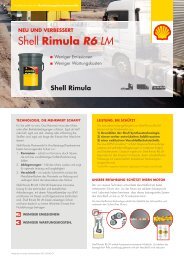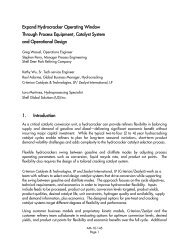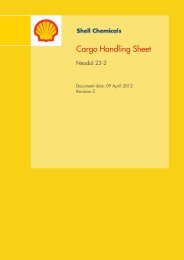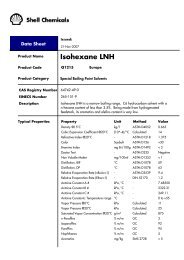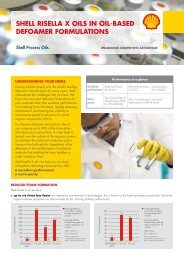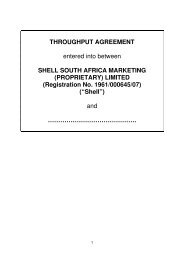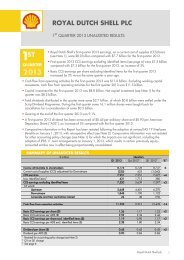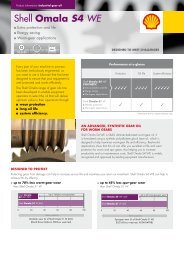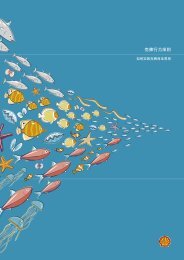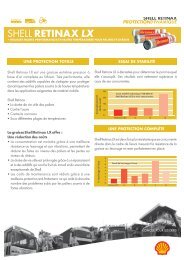12 impact BUSINESS 12 impact BUSINESS
12 impact BUSINESS 12 impact BUSINESS
12 impact BUSINESS 12 impact BUSINESS
Create successful ePaper yourself
Turn your PDF publications into a flip-book with our unique Google optimized e-Paper software.
<strong>BUSINESS</strong><br />
<strong>12</strong> <strong>impact</strong>
Building a winning team<br />
How change management and team building can help to optimise operations<br />
New technologies and good<br />
operating practices can help<br />
to enhance process plant<br />
operations, but it is often the way that<br />
changes are applied and managed<br />
that can make the difference to business<br />
performance.<br />
Saudi Petrochemical Company (Sadaf)<br />
is one of the largest petrochemical<br />
complexes in the Middle East, and is a<br />
joint venture between Saudi Basic Industries<br />
Corporation (SABIC) and Shell Chemicals<br />
Arabia LLC. The Sadaf vision is simple:<br />
to be the best petrochemical company.<br />
This objective is the driving force behind<br />
a sustained improvement effort that has<br />
involved every employee and all of the<br />
technical and business operations.<br />
In February 2005, Sadaf brought in<br />
an extensive, on-site team of consultants<br />
from Shell Global Solutions to review its<br />
operational models; examine corporate<br />
structures, internal communications and<br />
performance; and identify strengths and<br />
areas with potential for improvement.<br />
The intention of this major initiative was<br />
to support the Sadaf vision to be the best<br />
petrochemical company.<br />
Sadaf President, Fahad Al-Sharef<br />
explains, “Many senior Sadaf employees<br />
had been with the company throughout<br />
their careers, and the procedures they<br />
followed were well established. We<br />
saw an opportunity for improvement by<br />
building on what SABIC has done through<br />
its various organisational effectiveness<br />
programmes, and felt that Shell Global<br />
Solutions had the practical experience<br />
to help us make this transformation. They<br />
were not just experts in human-resource or<br />
change management: they were people<br />
who had practical experience of operating<br />
manufacturing facilities, and they brought<br />
this experience to the project.”<br />
The first step was to interview a large<br />
cross section of the organisation. From<br />
these interviews, it was determined that<br />
the Sadaf transformation would be a<br />
major change-management programme<br />
and should focus on five key topics:<br />
core values and behaviours; roles and<br />
responsibilities; work prioritisation; skills<br />
and competencies; and work practices.<br />
Al-Sharef continues, “Many improvements<br />
were targeted during the transformation.<br />
For example, we wanted to enhance<br />
the management and effectiveness of<br />
our maintenance programmes. This was<br />
an area where there was scope for<br />
improvement, and it was a key deliverable<br />
of the transformation.<br />
“Before the transformation, our weekly<br />
level of attainment from maintenance<br />
planning (the proportion of planned<br />
maintenance achieved) was typically<br />
67–72%. Better weekly planning and<br />
a new prioritisation system helped us to<br />
achieve levels of 91–98% for several weeks<br />
in a row. This has made maintenance<br />
more efficient, and it has helped us to<br />
make better use of resources. Ultimately,<br />
this should reflect in increased equipment<br />
availability and better plant performance.<br />
“Another aim was to improve the<br />
accountability behaviour across the<br />
company, starting with management. To<br />
do that, we began with defining our core<br />
values, and behaviour and accountability<br />
was one such area. We then developed<br />
what are called RACIE charts (RACIE<br />
= responsible, accountable, consult,<br />
inform and execute), which are basically<br />
tables that describe each job in a simple<br />
and straightforward way. These charts<br />
constitute an excellent tool that will greatly<br />
contribute to enhanced understanding<br />
of roles and responsibilities, whether for<br />
new employees or existing ones who are<br />
changing jobs,” Al-Sharef concludes.<br />
Review and team building<br />
In February 2007, with the transformation<br />
process well established, the Sadaf<br />
leadership team asked Shell Global<br />
Solutions to conduct an independent<br />
review that would examine the progress<br />
▼<br />
www.shell.com/globalsolutions<br />
<strong>impact</strong> 13
<strong>BUSINESS</strong><br />
▼<br />
that had been made towards the<br />
transformation project goals and assess<br />
the performance of the managers who<br />
reported to the Sadaf leadership team.<br />
Al-Sharef explains, “It was apparent to<br />
the leadership team that to institutionalise<br />
and build on the changes we had<br />
brought to the organisation during the<br />
transformation, we had to change<br />
ourselves and the way we managed.<br />
So we embarked on our own journey.”<br />
The team-building programme, designed<br />
and facilitated by Shell Global Solutions,<br />
took two years to complete and involved<br />
a series of intensive teamworking sessions<br />
with the leadership team and the newly<br />
extended leadership team. The work<br />
capitalised on SABIC’s leadership<br />
programme, which had been taken by<br />
most of the Sadaf managers.<br />
Performance is now evaluated and<br />
tracked using a balanced scorecard<br />
approach, which helps to determine<br />
whether operational activities are aligned<br />
with strategic objectives and to measure<br />
the key drivers of business activities. This<br />
method enables the leadership team to<br />
further optimise the management processes.<br />
The team-building<br />
programme<br />
Reshaping and extending the leadership<br />
team to include the managers who<br />
reported directly to it was recommended.<br />
The aim was to create a more effective<br />
leadership force. At the same time, there<br />
would be a new emphasis on developing<br />
personal charters and styles for individual<br />
managers – formally recognising that<br />
people work in different ways and<br />
acknowledging individual preferences for<br />
operating in a business environment.<br />
During 2007 and 2008, workshops<br />
were run that, in addition to helping<br />
to transfer new insights and skills,<br />
encouraged Sadaf staff to share and<br />
define their experiences of best practice,<br />
and to examine previous initiatives to<br />
understand the reasons for their outcomes.<br />
Using the information gained from these<br />
workshops, the key parts of the day-to-day<br />
business processes were examined and<br />
re‐engineered to help make them be<br />
more effective.<br />
Managers were encouraged to define<br />
the necessary input, purpose and aims of<br />
every meeting: to create space and time in<br />
their schedules to examine strategic themes<br />
rather than focusing on immediate issues<br />
and performance. Changes were made<br />
to the appraisal system, so that it reflected<br />
the importance of individual performance,<br />
teamwork and contributions to the core<br />
values and strategic aims of the business<br />
in addition to performance within an<br />
individual’s professional discipline.<br />
So that the transformation and teambuilding<br />
processes would be ongoing,<br />
Shell Global Solutions trained 4 general<br />
managers and 15 other members of the<br />
Sadaf workforce as facilitators and coaches<br />
to act as change agents in the company.<br />
Al-Sharef says, “Throughout my career, I<br />
have pushed for change and improvement,<br />
and it is great to see the changes that have<br />
taken place at Sadaf through the efforts<br />
of our staff. Our change journey is about<br />
taking control of our future and creating<br />
a work environment where Sadaf people<br />
can be the best that they can be.”<br />
“Shell Global Solutions<br />
were not just experts<br />
in human-resource or<br />
change management:<br />
they were people who had<br />
practical experience of<br />
operating manufacturing<br />
facilities, and they<br />
brought this experience<br />
to the project.”<br />
For more information contact:<br />
Alan Fuller<br />
Email: alan.fuller@shell.com<br />
14 <strong>impact</strong>



